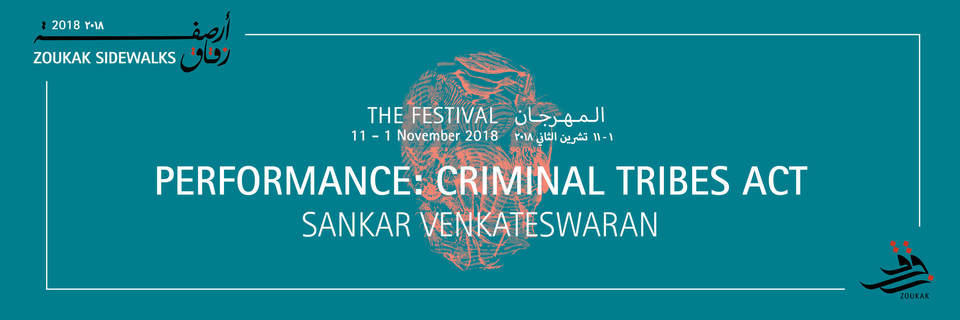Performance: Criminal Tribes Act

Performance: Criminal Tribes Act
Zoukak Sidewalks 2018 - The Festival presents:
Criminal Tribes Act
Performance
Sankar Venkateswaran
Wednesday 7 of November 2018 at 6:00 p.m. and 9:00 p.m. at Studio Zoukak
Tickets: 25,000 L.L.
Tickets available at ihjoz.com and at the door
Free Entry for students (upon presenting their Student ID), unemployed citizens, migrant domestic workers and people working in the artistic field (artists, technicians, administrators...). Those benefiting from the free entry are asked to show at the venue 30 minutes before the start of the event.
Language : English / Arabic subtitles
Synopsis
"[There is] no need to hear your voice, when I can talk about you better than you can speak about yourself. No need to hear your voice. Only tell me about your pain. I want to know your story. And then I will tell it back to you in a new way. Tell it back to you in such a way that it has become mine, my own. Re-writing you, I write myself anew. I am still author, authority. I am still [the] colonizer, the speaking subject, and you are now at the center of my talk."
-Bell Hooks, Marginality as a Site of Resistance
Criminal Tribes Act is a theatre piece that examines the inherent conflicts between the speaker and his subject, the spoken and the unspoken, and the inescapability of the 'us', 'them' and 'the other' social order. The piece ‘investigates’ the ways in which India has inherited modes of social exclusion and how it was legitimized through the colonial history. Starting with the example of Criminal Tribes Act of 1871, a legislation brought during the British rule which ostracized and labelled millions in India as 'born criminals', who later ‘became’ habitual offenders and recently, ex-criminals and de-notified tribes, the performance explores the human consequence and conditions brought out by social exclusion. The hierarchical classification of people based on caste and status within the Indian social structure dictates that individuals belonging to certain castes be socially excluded and alienated. The colonial state transformed such pre-colonial prejudices of Indian society into a structured classification of people. And in the post imperial/post colonial now, these stigmas are continuously re-inscribed on the bodies of individuals resulting in a complex human condition – that of broken existence.
This performance is a discursive conversation between two actors, Chandru and Rudy. They talk to each other about their backgrounds, experiences, differences; they talk to us, the spectators, and as they do so, one emerges as the speaker and the other, the subject. Privilege and disentitlement are personified as the speaker and the subject. Between them arises the conflicts of the spoken, the unspoken, the visible and the invisible, through which we are able to see the violent social engineering project of 'unseeing’, and how the un representably real violence fuels the fear which maintains this social order.
Credits
Directed by Sankar Venkateswaran
Performed by Chandra Ninasam, Anirudh Nair
Produced by Theatre Roots & Wings
Artist's Biography
Sankar Venkateswaran, born in 1979, is a theatre director from Kerala, India. He graduated from Calicut University School of Drama and Fine Arts, after which he completed Theatre Training and Research Programme, Singapore (presently Intercultural Theatre Institute). In 2007, he founded the theatre company Theatre Roots & Wings, and directed “Quick Death” (2007), “Sahyande Makan- The Elephant Project” (2008), “The Water Station” (2011), “When We Dead Awaken” (2012), “UDAL URAVU (Body/Source)” (2017), and “Criminal Tribes Act” (2017), among others.
He was the guest director at Munich Volkstheater, in the year 2016 and 2017, and directed “Tage der Dunkelheit (Days of Darkness)” and “INDIKA”. He has been a guest faculty at various institutions including Intercultural Theatre Institute, Singapore, National School of Drama, New Delhi, and NINASAM Theatre Institute, Heggodu. He served as the artistic director for International Theatre Festival of Kerala in 2015 and 2016. He was the jury member for Zurich Theater Spektakel in 2016. He is a recipient of International Ibsen Scholarship 2013 (Teater Ibsen, Norway), Ustad Bismillah Khan Yuva Puraskar Award 2011 (Government of India), Pro Helvetia Artist in Residence 2011 (Swiss Arts Council), and JENESYS Fellowship 2009 (The Japan Foundation/ Shinshu University).
He lives in Attappady, Kerala, where he has setup a space and works with the indigenous communities of the region.
أرصفة زقاق – المهرجان ٢٠١٨ يقدّم
القانون الجنائي للقبائل
عرض مسرحي
سانكار فينكاتيسواران
الأربعاء ٧ تشرين الثاني الساعة ٦:٠٠ مساءً والساعة ٩:٠٠ مساءً في استديو زقاق، بيروت
البطاقات: ٢٥،٠٠٠ ل.ل
البطاقات متوافرة عبر موقع ihjoz.com وعند مدخل الاستديو
الدخول مجاني للطلاب (عند إبراز بطاقة الطالب) و لعاملات المنازل المهاجرات وللمواطنين العاطلين عن العمل وللعاملين في مجال الفن ( فنانين، تقنيين، إدارة فنية...) . الرجاء من المستفدين من الدخول المجاني، الحضور الى الموقع قبل نصف ساعة على الأقل من بدء العرض.
عن العرض
لا داعي لسماع صوتك، خصوصاً حين أستطيع التحدث عنك أفضل مما يمكن أن تفعله أنت؛ لا حاجة لسماع صوتك. أخبرني فقط عن المك؛ أريد معرفة تفاصيل حكايتك. ومن ثم، سوف أقصها عليك بطريقة جديدة. أقصها عليك بعد أن أكون قد تملكتها، بعد أن تكون قد أصبحت لي. بإعادة كتابة قصتك، أعيد كتابة نفسي. ما زلت المؤلف، ما زلت السلطة. أنا المستعمر، صاحب الكلمة الآن، وأنت موضوعي.
بيل هوكس، الهامشية كموقع للمقاومة
"القانون الجنائي للقبائل" عرض مسرحي يحاول فهم النزاعات العضوية بين المتحدث وموضوعه، بين ما يعبر عنه من الكلام وما لا يعبر عنه، وعدم إمكانية الخروج من نظام اجتماعي متمحور حول هيكلية مؤلفة من ال"نحن" وال"هم" والتمييز عن كل ما هو آخر. يستقصي العرض الطرق التي اعتمدتها الهند في توارث الإقصاء الاجتماعي، والدور الذي لعبه الاستعمار في تشريع هذا الإقصاء. ينحني العرض أيضاً على الحالات والعواقب الناجمة عن هذا الإقصاء الاجتماعي، وذلك بدءًا من القانون الجنائي للقبائل المقر عام ١٨٧١، وهو تشريع صدر خلال الحكم البريطاني، أدى إلى اعتبار الملايين "مجرمين منذ الولادة"، وأصبحوا فيما بعد "مجرمين اعتياديين"، ولاحقاً "مجرمين سابقين". التصنيف الهرمي للأفراد بناءً على المكانة والطبقة الاجتماعية يفرض استبعاد المنتمين إلى بعض الطبقات وسلبهم جزء من حقوقهم. قام الاستعمار بتحويل هذا الإجحاف الموجود في المجتمع الهندي منذ ما قبل الاستعمار إلى تصنيف منظم ومقونن. في مرحلة ما بعض الاستعمار، ما انفكت هذه الوسوم تنقش بشكل متواصل على أجساد المنبوذين، مؤدية بذلك إلى حالة معقدة، حالة الحياة المهشمة.
يدور الحديث حول خلفيتهم، تجاربهما وأوجه الاختلاف بينهما؛ يتحدثان إلينا، نحن المشاهدون، وخلال ذلك، يظهر أحدهما كالمتحدث والآخر كالموضوع. تتمثل الامتيازات في شخصية المتحدث، أما الحرمان يجد نفسه متجسداً فالموضوع. وينشأ بينهما تدريجياً الصراع بين المحكي والظاهر من جهة، و غير المعبر عنه والمحجوب من جهة أخرى. من خلال هذه المواجهة، يظهر مدى عنف تجاهل الآخر والتغافل عن وجوده، المبني حولهما بنيان المشروع الاجتماعي الهندي.
فريق العمل
إخراج: سانكار فينكاتيسواران
أداء: شاندرا نيناسان، أنيرود ناير
إنتاج: Theatre Roots and Wings
سانكار فينكاتيسواران ، من مواليد ١٩٧٩، مخرج مسرحي من كيرالا، جنوب غرب الهند. بعد تخرجه من كلية الفنون الجميلة في جامعة كالكوتا، أكمل برنامج البحث والتدريب المسرحي في معهد التبادل الثقافي، سنغافورة. في عام 2007 ، أسس الفرقة المسرحية .Theatre Roots & Wings أخرج عدة مسرحيات من بينها "موت سريع" عام ٢٠٠٧ و"سهياندي ماكان – مشروع الفيل" عام ٢٠٠٨ و "محطة المياه" عام ٢٠٠٨ و"عندما نفيق نحن الأموات" عام ٢٠١٢ و "أودال/أورافو (جسد/مصر) عام ٢٠١٧ و"القانون الجنائي للقبائل" عام ٢٠١٧.
كان سانكار المخرج الضيف في مسرح ميونيخ فولكسثياتر لعامي ٢٠١٦ و٢٠١٧ ، حيث أخرج "أيام الظلام" و "إنديكا".
مثل سانكار كمحاضر ضيف في العديد من المعاهد ومنها معهد التبادل الثقافي في سنغافورة، والمعهد الوطني للفنون المسرحية في نيودلهي، ومعهد نيناسام للمسرح في هيغودو.
استلم الادارة الفنية لمهرجان كيرالا الدولي للمسرح في عامي ٢٠١٥ و٢٠١٦، وكان عضوًا في لجنة التحكيم لـ Zurich Theatre Spektakl عام ٢٠١٦.
سانكار حاصل على منحة "إبسن" الدولية لعام ٢٠١٣ في النرويج وجائزة Ustad Bismillah Khan Yuva Puraskar من الحكومة الهندية والإقامة الفنية Pro Helvetica من المجلس الفني السويسري ومنحة "جينيسيس" عام ٢٠٠٩ من The Japan Foundation/ Shinshu University.
يعيش حاليا في مدينة أتابادي في ولاية كيرالا، حيث قام بإعداد مساحة ثقافية يعمل فيه مع مجتمعات من السكان الأصليين في المنطقة.








